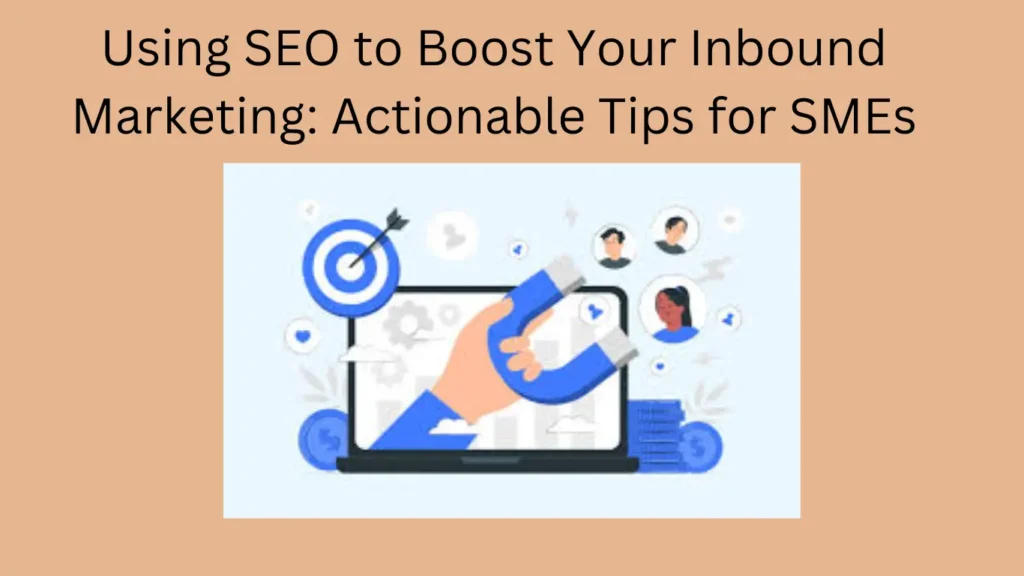Are you trying to boost conversions, revenue, and inbound lead generation? Perhaps it’s time to give your inbound marketing plan another look.
Inbound marketing calls for delicacy, tact, and a good dosage of SEO. In actuality, your SEO strategy and effective inbound marketing will be closely linked.
It can be a little challenging to get your SEO and inbound marketing to work together, but we’re here to show you how to use SEO to support your inbound marketing.
Inbound marketing: What is it?
When you use traditional or “outbound” marketing, you reveal your promotional messages to your audience while they are engaged in another activity. When using digital media, this doesn’t work very well because viewers may easily change channels or block your advertisements if they’re not to their liking.
If done incorrectly, your outbound digital marketing could be either completely undetectable or, in the worst case scenario, obtrusive and unsettling to prospective clients.
On the other side, inbound marketing is less obtrusive and aims to draw in customers who are actively searching for your goods or services.
Value-packed content is the mainstay of inbound marketing, which aims to draw in and hold the attention of prospective clients by making it simple for them to recognize the benefits, weigh their options, and convert to paying customers. Here, as opposed to outbound marketing, the consumer initiates communication.
One cannot stress the significance of inbound marketing enough. It is targeted to potential customers with a strong buy intent because its goal is to attract those who are already interested in your goods or services.
Why Inbound Marketing Needs SEO
Any inbound marketing plan must include organic SEO, and the foundation of this strategy is educational and superior content. But if no one sees it, even the best content won’t provide leads. It is insufficient to only create and publish content, as there are over 7.5 million blog entries produced daily. Additionally, it must be placed where your clients are likely to glance. This is where SEO comes into play.
Search engine optimization (SEO) raises the content’s exposure and rating on search engine results pages (SERPs), making it easier for users to find, interact with, and, if desired, contact your company. You can greatly increase the outcomes of your inbound efforts by combining SEO with inbound marketing.
One important element in determining audience intent is SEO. Providing useful content that fits the requirements and interests of the audience is the goal of inbound marketing. SEO, on the other hand, focuses on particular terms and phrases that people are using to make searches. Combining these strategies can help you find pertinent keywords that appeal to your target market and produce content that successfully answers their questions.
This strategy aims to produce long-term gains by forging enduring bonds with clients and encouraging brand loyalty. When done right, SEO may gradually increase organic traffic, increasing the life and audience for your content. Your inbound marketing plan will remain effective long after it is published if SEO is incorporated into your useful content.
Actionable SEO Strategies for Strengthening Inbound Marketing
Include a Keyword in the Content
After determining your target keywords, improve your content’s search engine ranking. Naturally include the selected keywords into your landing pages, articles, and blog posts. But keep in mind that giving your readers something of value should take precedence over filling your content with keywords, as this will improve engagement and increase your chances of ranking.
Compose Captivating Meta Tags
Create captivating meta descriptions and title tags for your websites. Users’ decisions to click through to your website are influenced by these aspects that they see in the SERPs. To get people to visit your website, employ an attention-grabbing call-to-action together with your main keyword.
Try Your Hand at Creating Links
Developing solid backlinks from reliable websites is a crucial SEO strategy that enhances inbound marketing. Take part in influencer outreach, guest posting, and content marketing to raise your material’s profile and legitimacy and draw in more prospective clients.
Make use of local SEO
If your company has a physical location, use local SEO techniques to connect with clients in the area. To enhance your local search presence, claim and optimize your Google My Business profile, add your company to local directories, and promote client reviews.
For further Inquires Contact Us
FAQs
Q: Why is SEO important for SMEs?
- A: SEO helps SMEs increase online visibility, attract targeted traffic, and generate leads, ultimately leading to business growth and success.
Q: What are some actionable SEO tips for SMEs?
- A: Some actionable SEO tips for SMEs include optimizing website content with relevant keywords, improving website speed and mobile responsiveness, creating quality backlinks, and optimizing for local search.
Q: How can SMEs integrate SEO into their inbound marketing strategy?
- A: SMEs can integrate SEO into their inbound marketing strategy by creating valuable, optimized content that attracts and engages their target audience, optimizing landing pages for conversion, and leveraging social media and email marketing to amplify their SEO efforts.
Q: How long does it take to see results from SEO efforts for SMEs?
- A: The timeline for seeing results from SEO efforts can vary depending on factors such as competition, industry, and the effectiveness of the SEO strategy. Generally, SMEs may start seeing noticeable results within a few months of implementing SEO strategies consistently.
Q: What are some common SEO mistakes SMEs should avoid?
- A: Common SEO mistakes SMEs should avoid include neglecting local SEO, keyword stuffing, ignoring website usability and user experience, neglecting mobile optimization, and failing to regularly update and optimize website content.
